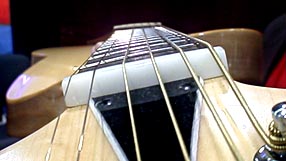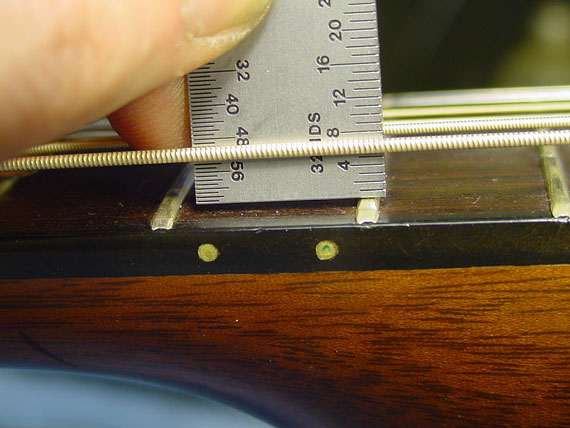So; You're interested in playing the guitar, but you're not to sure about buying one? Or on a short budget? There are plenty of good used guitars you can buy for a low amount of money that suit perfectly for beginners or early advanced players. In this tutorial I'll show you what the points of interests are when buying a second hand cheap guitar:
- The overall condition – Look the guitar over and make note of any obvious damage – guitars often take a bit of wear and tear and if its just small scrapes and scratches then the guitar will probably be fine. Look for rust also, not on the strings, but on the hardware that is holding the strings and the pickups. If there is any rust in these places, run, it is not worth it! What good is a guitar that may fall apart on you in the near future? Trust me – leave it alone.
- The neck of the guitar – the neck is important. Here are some areas to look at:
- Make sure that the neck is not warped or out of shape in any way.
- Excessive warped Guitar Neck
 |
| Excessive warped Guitar Neck |
- Check the area where the neck joins to the body of the guitar – look for cracks where it may have been broken in the past.
- In the same fashion, check the area where the neck joins the head of the guitar.
- Check the action – Action is a word that describes how close the strings are to the fret board starting at the head of the guitar all the way down to the bridge. It is preferable to have the strings very close to the fret board as to make it easier to press them down (not so close that they are touching of course). If the strings are nice and close to the fret board all the way along, you would say that the guitar has a good action. Pictured right is a guitar with poor action. Notice that the strings sit quite far off the fret board. Guitars with poor action are harder to play and do not sound very good. You can fix the action on your guitar by taking it to a guitar technician, but it will cost you between $20 and $50.
 |
| Lots of Action |
- Check the intonation of the strings. Intonation is a word that describes the accuracy of each individual note that the guitar can produce on any string. If the intonation is correct, every note on the guitar will be the correct pitch – If it is out, the guitar will be impossible to tune and it will sound horrible. To roughly check the intonation, play the E shape barre chord on each fret of the guitar. As you move towards the bridge of the guitar, you should hear the chord keeping its pitch – if not, the intonation is out, and you will need to get a guitar technician to work on the problem.
- If the guitar you are looking at is an electric, you must plug it in and see how it sounds through an amp. Ask the seller if you can play it through your amp and if you do not have one, ask someone if you can borrow his or hers. Try the following when testing an electric guitar through an amp:
- Turn the amp up to a fair volume level and then play with the volume and tone controls by turning them to full and then back to zero. Test the pickup selector by flicking its switch back and forth. Carefully listen to any sounds while doing these things. You are looking for scratchy sounds or clicks that might indicate old or worn electrics.
- Strum a single chord and while the chord is ringing start playing with the controls like before, still listening for scratches, clicks, or any other nasty sounds. Guitar technicians can fix these problems and most guitars need to service every 5 - 10 years. Just be aware of this fact or you could find yourself spending more money than you first intended.
- Check, the sound of the guitar – Before you buy, you want to know that the guitar sounds like it should. Once you have tested the guitar sound, go to a music store, and ask to play on a new model of that guitar. If possible, use a similar amplifier to the one that you tested the second hand guitar on, and see if you notice any BIG differences. There is a simple rule that I like to follow: If you are not happy with the guitar sound… Do not buy it!
- The most important thing to remember when shopping for any guitar is... Do not shop impulsively.
- A guitar is a major purchase and you want to get the right one. Leave yourself time to go away and think about the purchase. If you have doubts when checking out a guitar, you are probably better to leave it and hold out for something that better suits you.
- If you are new to the guitar and a little worried about testing guitar in public – do not worry. It is important to remember that you are not there to highlight your playing ability – you are there to discern whether your proposed buy is a good deal or not so just go for it.
- If you are still worried, take an experienced guitarist along with you when you are looking at a possible purchase. See if you can persuade a teacher or a friend – most musicians love to help newbies. Not only will they be able to offer helpful advice – they will be good moral support when it is time to pick up the guitar and test it out in public.
This is quite a list, but as mentioned before, buying a guitar is quite a big purchase, and you really want to have a good first guitar, so you'll help yourself a lot by reading and understanding this article!


No comments:
Post a Comment